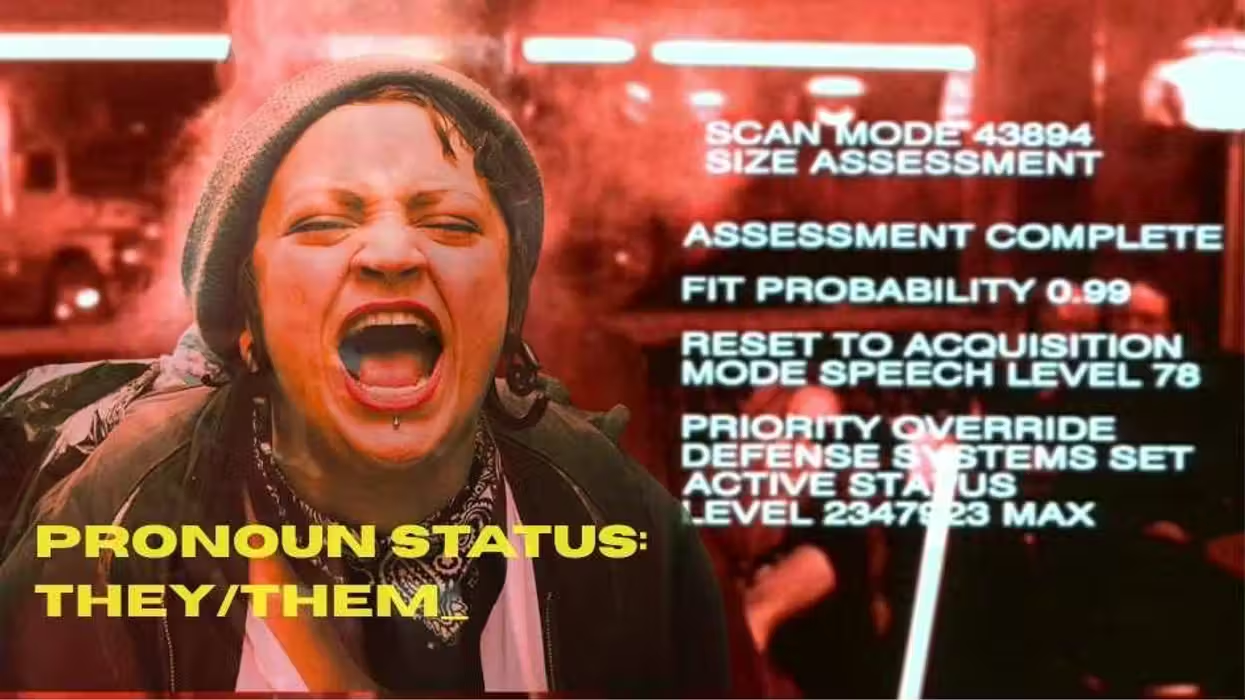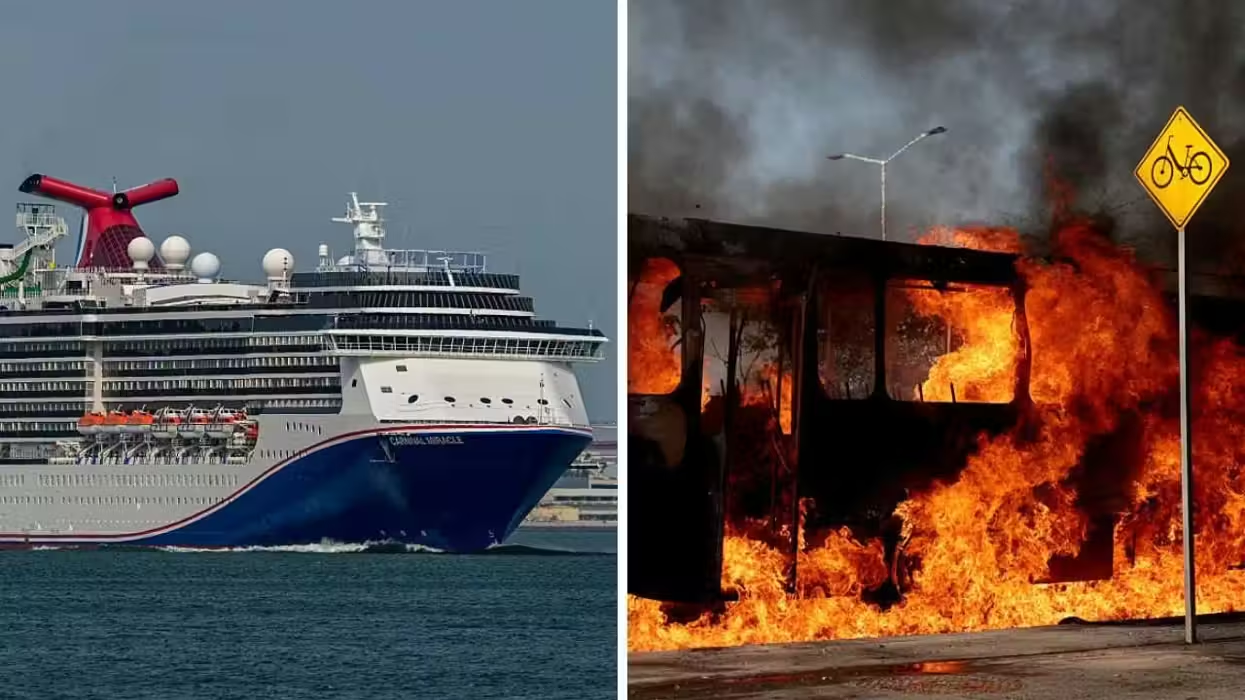
© 2026 Blaze Media LLC. All rights reserved.
How the Russia-China Axis puts America at 'as great or greater risk than we were in the Cold War
October 03, 2014
"[O]ur enemies are exponentially increasing their expenditures, making more sophisticated weapons, flouting arms control agreements...we have a crisis here, and one that's both been unacknowledged and un-discussed."
While the world focuses on ISIS, long-time Democratic campaign consultant Doug Schoen and co-author Melik Kaylan have done the yeoman's work in a new book titled "The Russia-China Axis," to document the political, military, economic, technological and ideological war that America is in with an allied and strategically focused Russia and China, that leaders in Washington have been all to reticent to acknowledge, articulate, let alone devise a strategy to counter.
I spoke with Schoen in connection with his new book, to discuss in-depth how Russia, increasingly in the news not only over Ukraine but Prime Minister Putin's nuclear saber-rattling (backed by a greater quantity of deployed nuclear weapons than America) and China, led by President Xi Jinping, increasingly in the news over Hong Kong and actions in the South China Sea, are working with each other, rogue nations and non-state actors to undermine the West.
In a comprehensive interview that you can listen to in full below, Schoen told me:
"[W]e are at risk...The United States has no strategy and no will to take on an emerging alliance that puts us at as great risk as we've been since the Cold War...Russia's...expansionist. They changed the borders of Europe for the first time since the Second World War. And they are increasing their defense budget exponentially, upgrading their nuclear weapons, and have made it clear to us and to the Europeans that they are prepared to take us on. And for the Chinese, we've seen a similar level of expansionism in the East China Sea and the South China Sea, and a willingness to tolerate a nuclear North Korea which arguably will put us and indeed the world at increasing risk as time goes on."
But Russia and China are not just building up their strength by gobbling up territory. They also work against the West by proxy, as illustrated through their votes in the United Nations. Such activities not only consist of trading with, building infrastructure of and providing weaponry for nations like Iran, Syria, North Korea, or Venezuela, but also by either directly or indirectly aiding and abetting terrorist groups.
[sharequote align="center"]Russia and China are doing virtually nothing to suppress Islamist extremism.[/sharequote]
Schoen notes that "[T]here's almost no evidence of Russia or China ever trying to restrain groups that we consider promoting terrorism, and in fact if anything, we have to assume that they tacitly or actively support the efforts and aims of groups like...Hamas...and Hezbollah...Russia and China are doing virtually nothing to suppress Islamist extremism."
Underscoring this point, Schoen points out that "When we announced the bombing campaign against ISIS, the most prominent objectors were Russia and China. They basically said, "You can't bomb a sovereign nation -- to wit, Syria -- without approval of the Syrian government," a close ally of Russia.
But it was in the area of cybersecurity that Schoen's warning was perhaps most chilling, in which he laid out the capabilities of a Russia and China that could carry out crippling attacks on American interests and the American homeland itself, immediately bringing to mind the doomsday scenario laid out in a thriller we covered, "The Prince of Risk." Schoen told us [links ours]:
[sharequote align="center"]Russia can shut countries down. They can shut governments down.[/sharequote]
[instory-book ISBN="9781594037566"]
"It is one thing to have cybersecurity or cyber initiatives as a defensive measure to protect ourselves...or...as we saw with Stuxnet to try to disable nuclear programs. It is another thing to have state-sponsored cyber threats to our nation, to our national security, and to our infrastructure -- to our grid, to corporations and to our government -- in ways that could potentially disable us both individually or as part of a larger effort to wage war or at the very least conflict with the United States.And both the Chinese through the Chinese People's Army and the Russians through hackers and I think state-sponsored efforts as well, have made it very clear by word and by deed that this is something they're willing to consider and countenance. And look, I just think we have to be prepared to fight fire with fire, and hopefully we can recognize that Russia and China are not our friends, are not going to really...help us, notwithstanding the lip service they may pay...
Russia can shut countries down. They can shut governments down. They can destabilize industries and potentially destabilize our own government, as have the Chinese. And they have shown a willingness [in Estonia and Georgia]...and an inclination to expand, not retard their effort. So this is just another aspect that doesn't get the amount of time or attention that it necessarily could or should."
Conversely, the U.S. is:
"...reducing our [nuclear] arsenal. We are investing less. All the while our enemies are exponentially increasing their expenditures, making more sophisticated weapons, flouting arms control agreements, and...Vladimir Putin announced a couple of weeks ago that he was taking titular control personally of the Russian arms control agency. So we have a crisis here, and one that's both been unacknowledged and un-discussed."
Further, the saber-rattling of Russia regarding its nuclear weapons, and China regarding the possibility of unleashing a financial nuclear weapon in liquidating its U.S. Treasury holdings and diversifying out of the U.S. dollar is:
[sharequote align="center"][W]e have to (in my judgment) upgrade, re-arm and face reality, as we know it to be.[/sharequote]
"...more than rhetoric. It's reality that we do not have a response in place to deal with them, and it's all well and good whether you be a Democrat or Republican to talk about a nuclear-free world, but when our adversaries are going in the opposite direction, we have to (in my judgment) upgrade, re-arm and face reality, as we know it to be."
Schoen concludes:
"We are at...as great or greater risk than we were in the Cold War, and part of the reason is that we just don't know the full dimensions of the threat, and to the extent they have been outlined they've not been fully articulated and understood."
Note: The links to the books in this post will give you an option to elect to donate a percentage of the proceeds from the sale to a charity of your choice. Mercury One, the charity founded by TheBlaze’s Glenn Beck, is one of the options. Donations to Mercury One go towards efforts such as disaster relief, support for education, support for Israel and support for veterans and our military. You can read more about Amazon Smile and Mercury One here.
–
Follow Ben Weingarten (@bhweingarten) and TheBlazeBooks on Twitter and Facebook.
You can find all of our Blaze Books interviews on Soundcloud and Stitcher, and subscribe to our podcast automatically via iTunes.
Want to leave a tip?
We answer to you. Help keep our content free of advertisers and big tech censorship by leaving a tip today.
Want to join the conversation?
Already a subscriber?
Ben Weingarten is a writer, commentator, and editor at large at RealClearInvestigations. He is a senior contributor at the Federalist and writes columns for Newsweek and the Epoch Times.
Ben Weingarten
Ben Weingarten is a writer, commentator, and editor at large at RealClearInvestigations. He is a senior contributor at the Federalist and writes columns for Newsweek and the Epoch Times.
more stories
Sign up for the Blaze newsletter
By signing up, you agree to our Privacy Policy and Terms of Use, and agree to receive content that may sometimes include advertisements. You may opt out at any time.
Related Content
© 2026 Blaze Media LLC. All rights reserved.
Get the stories that matter most delivered directly to your inbox.
By signing up, you agree to our Privacy Policy and Terms of Use, and agree to receive content that may sometimes include advertisements. You may opt out at any time.






